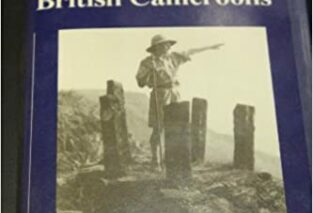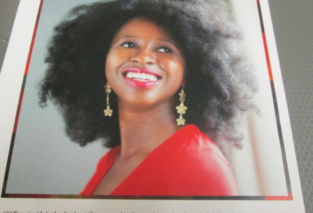On April 10, 2021 Spears Media launched Dr. Joyce Ash’s collection of poems entitled Beautiful Fire. I was one of the speakers on that occasion and here is what I said.
xxxxxxxxxxxxxx
I thank Spears Media for giving me the opportunity to say a word or two on the occasion of the virtual launch of this award-winning collection of poems: Beautiful Fire. My presentation, which I intend to keep short and simple, is in two parts. In the first part, I talk about the author, not the traditional bio-data-type introduction (date of birth, schools attended, diplomas earned, etc.) No, I simply want to pay the author, Dr. Joyce Ash, whom I shall refer to simply as Dr. J., a debt of gratitude, which I have owed her for over a decade. In the second part, I zero in on her book, mainly on the title, which is what caught my attention most.
First things first. How and where did I first meet Dr. J.? It was sometime in the late 90s. I was then working for an American oil company with its head office in Bonanjo, Douala, and its corporate head office was in Houston, Texas. One morning, the receptionist called to tell me that there was a young lady who wanted to see me. A young lady? So early in the morning? My mind raced all over the place as I wondered if I had been a bad boy and the aftermath of my transgression was trailing me. After what we, Roman Catholics, call “an examination of conscience,” I was sure that I had nothing to reproach myself for, so I asked her name, which sounded vaguely familiar. I asked that she be ushered in. My office was on the 7th floor and, as I waited for her, I had enough time to put my mind and even my office in order.
Then, a beautiful young lady walked in, and rewarded me with a broad smile as we shook hands. I then recognized her for her role in some plays I had seen on Cameroon television. I congratulated her on her marvelous performance on stage. I recalled Professor Godfrey Tangwa (Gobata), who was himself quite a presence on stage, mentioning her as a girl with great potential.
I asked what I could do for her and she said she had been sent by Dr. Boniface (“Bob”) Forbin to remind me of a promise I had made to write a column in his newspaper, The Herald. “Bob” and I had worked together on a magazine he produced when he worked for Cameroon Airlines before moving out to create his own paper. The Herald, in Bob’s expert hands, became the most sought-after, the most-sought for, and the most quoted English paper in the country, mainly for the high quality of its beautifully-crafted articles by a team of highly motivated and well-tutored young journalists, the likes of Dr. J. herself, Douglas Achingale, Franklin Bayen, among others. The editorials that flowed from Bob’s pen qualitatively stood high above any one could find in any other English newspaper in Cameroon at the time.
I had, indeed, promised “Bob” that I was going to collaborate with him, and I reassured him, through Dr. J., that I had not forgotten my promise and that I would make good on it. Unfortunately, shortly thereafter, I was promoted to a new position requiring many training sessions. Writing articles for outside publications took the back burner, and finally I never kept my promise to Bob.
Fast forward to the year 2006. My brother Kenjo Jumbam, author of The White Man of God, The White Man of Cattle, Lukong and the Leopard, among others, died. I was preparing the funeral booklet containing the Mass readings and some eulogies from family members and friends when his son, Amosa, called from New Jersey to tell me that a certain Dr. Joyce Ashuntangntang had sent him a really good eulogy of his father. I asked him to send it to me and I was floored by it. I immediately included it in the booklet and it was Dr. J.’s contribution that captured the attention of all who attended my brother’s funeral. In fact, in church itself, mourners, including priests at the altar, could hardly lift their heads from her homage to my brother. Even after the funeral Mass, one man, who opted to say a word, surprised us by turning to the tribute and literally reading it out to us because, he said, it was so beautifully written. It is that debt of gratitude I have paid you this day, Dr. J. Once more, thank you.
Now, with that off my chest, let me turn my attention to your book. When I picked up Beautiful Fire, I felt like one of those blind men in the Indian parable who had never come across an elephant before and who learned to picture it in their minds by touching it. As I groped this collection of poems – and I am using the word grope in a positive sense — my hand fell on the title, and I clung to it. It may sound strange that the title of your book could have caught my attention to the extent that I decided to reflect on it but it did.
As soon as I saw the title, my mind went to the present Cameroonian context, and I asked myself if fire can truly be said to be beautiful. For an answer, I took a quick look into the place of fire in the mythologies of the world. As we all know, fire is one of the four elements attributed to nature – the others being earth, water and air . In Greek mythology, fire was seen as a generous gift from one of their gods, Promethus, who stole it from the Olympian gods for the benefit of mankind, and was greatly punished for it. To the Romans, the god of fire was called Vulcan, which has given us the word volcano, which reflects the destructive aspects of fire.
In Egyptian mythology, Ra was the fire god of the sun, light, warmth, and growth. In Yoruba mythology, Ogun is the fire god and patron of blacksmiths, iron, warfare and metal tools. Oya, the goddess of fire and wind while Shango is the god of thunder and fire.
I haven’t, unfortunately, found the origin of fire in the mythology of my own people of Nsoland. But up until quite recently, anyone, like me, who grew up in the hills of Nsoland in the 50s and 60s, would quickly associate fire with the warmth it gave and the food it cooked for us. It is a very positive image of fire; fire that is beautiful. I recall how in the morning my siblings and I would jump out of bed with our blankets still wrapped around our bodies and scramble for a better spot around the hearth, the fire place, and mama would threaten to knock sense into our fat heads if we did not behave. You always dreaded being asked to go out and bring more firewood from behind the house because the cold wind would hit your face and ears like a well-aimed slap. Fire, in that context, could be said to beautiful!
Several years later, when I went down to Victoria, the coast, as we called it, I saw how different the concept of fire could be to a young person of my age who was born and bred there. The weather was so stiflingly hot that only a candidate for suicide would think of crouching around a fire in the evening or early in the morning, as we did upcountry. There, you learnt to keep a respectful distance from fire. That was a sharp contrast from Nsoland where fire was something truly beautiful that attracted rather than repulse.
Those were the days before the politicians showed up at the horizon and decided that fire should best be used as an element of intimidation and destruction. That is the image of fire in what has come to be known as “Ground Zero,” the restive English-speaking northwest and southwest regions of Cameroon where separatists have been fighting for an independence for the past five years. There, houses are being torched, farm products, that had long been considered sacrosanct – and rightly so because of their life-giving elements — are now being torn down from the barns and silos and set ablaze in plain sight of the poor farmer – if he is lucky not to be fodder for the same flames.
Here I am strongly reminded of the destruction caused by fire in another collection of poems, still by Dr. J. and Tande Dibussi, Bearing Witness: Poems from a Land in Turmoil, still from Spears Media, which we had a chance to review together not that long ago. There, the acidic stench of burnt homes, some containing the corpses of the inhabitants, claws its way into the nostrils of the mind as you go through those poems. Even though the poems in Beautiful Fire do not evoke the same emotional intensity, they are nevertheless no less depressing.
Differences are now being settled, not around the warmth of the fireside, as I saw my elders do in my younger years, but rather with the gun that spits out destructive fire from its nozzle. The struggle now is to see who has superior fire power to outgun the other (“One Death is Too Many,” p. 55)
Other striking images are of women whose wombs have become the playground for men’s lust as rape runs amok through many of these poems (“Something Remained,” p. 4; “Speaking Up” – dedicated to Koumate Monique, the unfortunate woman who died outside a hospital in Douala for lack of proper medical care, among others). As I read them, I could hear the screams of abused women assaulting my ears and even where the sensuous and the sensual elements hold hands, there is still a feeling that the woman is on the suffering end (Incantations, p. 2.) Even where the erotic holds sway, (“Letter to a poet” p. 43), the feeling of joy which should normally be associated with such acts is absent and is replaced by a feeling of constraint and dominance. There is no beautiful fire in such relationships.
Another remarkable feature of these poems is the poet’s solidarity with suffering humanity as a whole. Not only does she take a firm stand against abuses in her homeland – “Ma Heart Go Burst!” (p. 50), a powerful poem in Pidgin decrying the neglect that led to the train derailment in Eseka in Cameroon in 2016 that killed many people — she also stretches her poetic hand of solidarity to the downtrodden across the globe (Iraq — the abuse of Kurds; Bangladesh, the Hazara people of Pakistan, Nicaragua, among other places. This reminds me of Pope Francis, who urges us to break out of the cocoon of our indifference and have the courage to go to the peripheries of our lives and our cities where the poor and the marginalized of society live, and there stretch out a hand of charity and brotherly love to them. That is what the poet does here. She goes beyond her comfort zone as she lights, with her poems, the beautiful fire of human kindness. Where such fire has been quenched, through human greed, the poet’s denunciatory voice rises in rightful indignation.
The fire that burns in Beautiful Fire has a cleansing effect. It punctures the hypocrisies of societies — local and international — that brutalize and abuse women, children and the defenceless. These poems are so memorable because they are expressed in simple, straightforward language that continue to ring in my ears long after I have finished reading them. Those who singled out this collection of poems for the “Book of the Year Award” should be applauded for making such a judicious choice.


